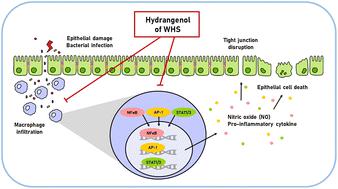当前位置:
X-MOL 学术
›
Food Funct.
›
论文详情
Our official English website, www.x-mol.net, welcomes your
feedback! (Note: you will need to create a separate account there.)
Hydrangenol, an active constituent of Hydrangea serrata (Thunb.) Ser., ameliorates colitis through suppression of macrophage-mediated inflammation in dextran sulfate sodium-treated mice
Food & Function ( IF 5.1 ) Pub Date : 2023-07-12 , DOI: 10.1039/d3fo01243c Su-Yeon Kim 1, 2, 3 , Kyung-Sook Chung 1 , Seo-Yun Jang 1, 4 , Hee-Soo Han 1, 2 , So-Won Heo 1, 5 , Jong Kil Lee 3, 4, 6 , Hyoung Ja Kim 7 , Yu-Kyong Shin 8 , Hye Shin Ahn 8 , Sun Hee Lee 8 , Kyung-Tae Lee 1, 2, 3
Food & Function ( IF 5.1 ) Pub Date : 2023-07-12 , DOI: 10.1039/d3fo01243c Su-Yeon Kim 1, 2, 3 , Kyung-Sook Chung 1 , Seo-Yun Jang 1, 4 , Hee-Soo Han 1, 2 , So-Won Heo 1, 5 , Jong Kil Lee 3, 4, 6 , Hyoung Ja Kim 7 , Yu-Kyong Shin 8 , Hye Shin Ahn 8 , Sun Hee Lee 8 , Kyung-Tae Lee 1, 2, 3
Affiliation

|
Ulcerative colitis (UC) is a chronic disease of the colon characterized by mucosal damage and relapsing gastrointestinal inflammation. Hydrangea serrata (Thunb.) Ser. and its bioactive compound, hydrangenol, are reported to have anti-inflammatory effects, but few studies have investigated the effects of hydrangenol in colitis. In the present study, we evaluated for the first time the anti-colitic effects and molecular mechanisms of hydrangenol in a dextran sodium sulfate (DSS)-induced mouse colitis model. To investigate the anti-colitic effects of hydrangenol, DSS-induced colitis mice, HT-29 colonic epithelial cells treated with supernatant from LPS-inflamed THP-1 macrophages, and LPS-induced RAW264.7 macrophages were used. In addition, to clarify the molecular mechanisms of this study, quantitative real time-PCR, western blot analysis, TUNEL assay, and annexin V-FITC/PI double staining analysis were conducted. Oral administration of hydrangenol (15 or 30 mg kg−1) significantly alleviated DSS-induced colitis by preventing DAI scores, shortening colon length, and colonic structural damage. F4/80+ macrophage numbers in mesenteric lymph nodes and macrophage infiltration in colonic tissues were significantly suppressed following hydrangenol treatment in DSS-exposed mice. Hydrangenol significantly attenuated DSS-induced destruction of the colonic epithelial cell layer through regulation of pro-caspase-3, occludin, and claudin-1 protein expression. Moreover, hydrangenol ameliorated abnormal tight junction protein expression and apoptosis in HT-29 colonic epithelial cells treated with supernatant from LPS-inflamed THP-1 macrophages. Hydrangenol suppressed the expression of pro-inflammatory mediators, such as iNOS, COX-2, TNF-α, IL-6, and IL-1β through NF-κB, AP-1, and STAT1/3 inactivation in DSS-induced colon tissue and LPS-induced RAW264.7 macrophages. Taken together, our findings suggest that hydrangenol recovers the tight junction proteins and down-regulates the expression of the pro-inflammatory mediators by interfering with the macrophage infiltration in DSS-induced colitis. Our study provides compelling evidence that hydrangenol may be a candidate for inflammatory bowel disease therapy.
中文翻译:

Hydrangenol 是 Hydrangea serrata (Thunb.) Ser. 的活性成分,通过抑制葡聚糖硫酸钠治疗的小鼠巨噬细胞介导的炎症来改善结肠炎
溃疡性结肠炎(UC)是一种慢性结肠疾病,其特征是粘膜损伤和复发性胃肠道炎症。绣球花(Thunb.) Ser. 据报道,其生物活性化合物绣球酚具有抗炎作用,但很少有研究调查绣球酚对结肠炎的作用。在本研究中,我们首次在右旋糖酐硫酸钠(DSS)诱导的小鼠结肠炎模型中评估了绣球酚的抗结肠炎作用和分子机制。为了研究绣球酚的抗结肠炎作用,使用了 DSS 诱导的结肠炎小鼠、用 LPS 发炎的 THP-1 巨噬细胞上清液处理的 HT-29 结肠上皮细胞和 LPS 诱导的 RAW264.7 巨噬细胞。此外,为了阐明本研究的分子机制,还进行了定量实时PCR、蛋白质印迹分析、TUNEL测定和膜联蛋白V-FITC/PI双染色分析。口服八氢苯酚(15或30 mg kg -1)可通过预防DAI评分、缩短结肠长度和结肠结构损伤,显着减轻DSS诱导的结肠炎。对 DSS 暴露的小鼠进行绣球酚治疗后,肠系膜淋巴结中的F4/80 +巨噬细胞数量和结肠组织中的巨噬细胞浸润显着受到抑制。Hydragenol 通过调节 pro-caspase-3、occludin 和 claudin-1 蛋白表达,显着减弱 DSS 诱导的结肠上皮细胞层破坏。此外,在用 LPS 发炎的 THP-1 巨噬细胞上清液处理的 HT-29 结肠上皮细胞中,八氢苯酚可改善异常的紧密连接蛋白表达和细胞凋亡。在 DSS 诱导的结肠组织中,Hydrangenol 通过 NF-κB、AP-1 和 STAT1/3 失活来抑制促炎介质的表达,例如 iNOS、COX-2、TNF-α、IL-6 和 IL-1β和 LPS 诱导的 RAW264.7 巨噬细胞。综上所述,我们的研究结果表明,绣球花酚通过干扰 DSS 诱导的结肠炎中的巨噬细胞浸润来恢复紧密连接蛋白并下调促炎介质的表达。我们的研究提供了令人信服的证据,证明绣球酚可能是炎症性肠病治疗的候选药物。
更新日期:2023-07-12
中文翻译:

Hydrangenol 是 Hydrangea serrata (Thunb.) Ser. 的活性成分,通过抑制葡聚糖硫酸钠治疗的小鼠巨噬细胞介导的炎症来改善结肠炎
溃疡性结肠炎(UC)是一种慢性结肠疾病,其特征是粘膜损伤和复发性胃肠道炎症。绣球花(Thunb.) Ser. 据报道,其生物活性化合物绣球酚具有抗炎作用,但很少有研究调查绣球酚对结肠炎的作用。在本研究中,我们首次在右旋糖酐硫酸钠(DSS)诱导的小鼠结肠炎模型中评估了绣球酚的抗结肠炎作用和分子机制。为了研究绣球酚的抗结肠炎作用,使用了 DSS 诱导的结肠炎小鼠、用 LPS 发炎的 THP-1 巨噬细胞上清液处理的 HT-29 结肠上皮细胞和 LPS 诱导的 RAW264.7 巨噬细胞。此外,为了阐明本研究的分子机制,还进行了定量实时PCR、蛋白质印迹分析、TUNEL测定和膜联蛋白V-FITC/PI双染色分析。口服八氢苯酚(15或30 mg kg -1)可通过预防DAI评分、缩短结肠长度和结肠结构损伤,显着减轻DSS诱导的结肠炎。对 DSS 暴露的小鼠进行绣球酚治疗后,肠系膜淋巴结中的F4/80 +巨噬细胞数量和结肠组织中的巨噬细胞浸润显着受到抑制。Hydragenol 通过调节 pro-caspase-3、occludin 和 claudin-1 蛋白表达,显着减弱 DSS 诱导的结肠上皮细胞层破坏。此外,在用 LPS 发炎的 THP-1 巨噬细胞上清液处理的 HT-29 结肠上皮细胞中,八氢苯酚可改善异常的紧密连接蛋白表达和细胞凋亡。在 DSS 诱导的结肠组织中,Hydrangenol 通过 NF-κB、AP-1 和 STAT1/3 失活来抑制促炎介质的表达,例如 iNOS、COX-2、TNF-α、IL-6 和 IL-1β和 LPS 诱导的 RAW264.7 巨噬细胞。综上所述,我们的研究结果表明,绣球花酚通过干扰 DSS 诱导的结肠炎中的巨噬细胞浸润来恢复紧密连接蛋白并下调促炎介质的表达。我们的研究提供了令人信服的证据,证明绣球酚可能是炎症性肠病治疗的候选药物。































 京公网安备 11010802027423号
京公网安备 11010802027423号